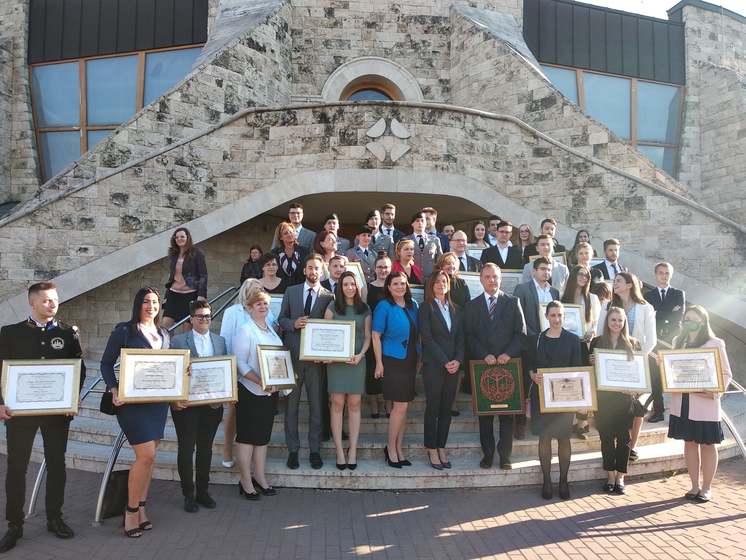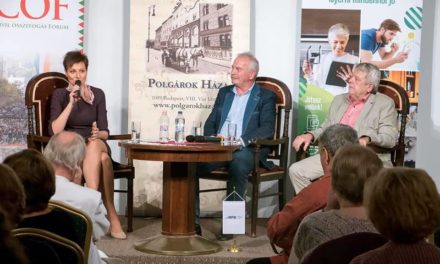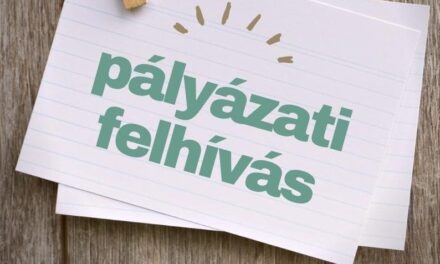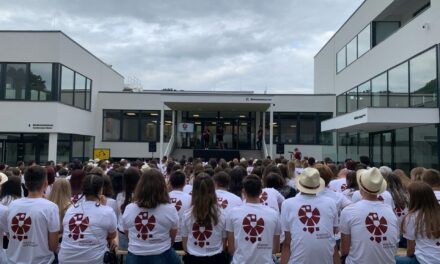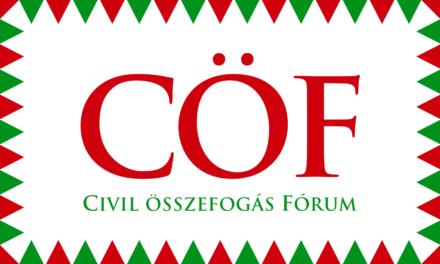This year, for the fifth time, the award for Hungarian Families consisting of the plaque of the ceramic sculptor Judit Józsa and the decorative letter painted by the code writer Katalin Szalai was presented, which - exceptionally this year - was awarded to Dr. János Szlávik and dr. All staff members of the Department of Infectious Diseases, Anesthesiology and Intensive Care at Dél-Pest Centrumkórház, managed by chief physicians Ilona Bobek.
Founded in 2016 by the Association of Hungarian Women's Interests, the Award for Hungarian Families can be awarded every year to a person or community who, through scientific, public, charitable, community-building activities, and personal example, develops its activities in the interest of Hungarian families.
, who took the lion's share in defeating the coronavirus epidemic, were greeted by Judit Varga, Minister of Justice , and received the award from her. In his welcome speech, the head of the ministry highlighted that almost the entire Hungarian society was affected by the epidemic, and many unfortunately also lost their relatives. According to the politician, the attitude of health workers was unprecedented, but he also spoke about the role of churches. About János Szlávik, he said that as a chief physician and member of the operational team responsible for the prevention of the epidemic, he had a key role in the fight against the coronavirus, and with his understandable statements, he contributed to a large extent to the people understanding what we are facing, reports Magyar Nemzet .
In addition to János Szlávik , the Hungarian universities whose students participated in the defense also received certificates of recognition.
The diplomas awarded to higher education institutions in Budapest, Pécs, Szeged and Debrecen were received by the leaders of the student governments. In addition to them, the 106-year-old Hungarian Protective Service and the Csíki Beer Manufaktúra also received recognition, the latter for its donation activities during the epidemic.
Kinga Szőnyi the president of the Association of Hungarian Women's Interests, which founded the award , concluded by saying that she hopes that next year there will not be a need for so many laureates, because by then we will be able to leave the epidemic behind us. The award ceremony was held at the Holy Angels Parish in Hoszágrét.
Thousands of young Hungarians helped fight the epidemic
This year, the students of ten universities and one high school were recognized for their voluntary work in the fight against Covid-19. kepmas.hu the young people what motivated them to help as volunteers even in dangerous conditions.
Volunteering develops one's character
Levente Hegyi , an 18-year-old cadet student at Than Károly Eco School in the capital, put together packages of masks, rubber gloves, and protective equipment for the testing points. Although the task only took four days, he often started at five in the morning, and then he even had classes. Despite all this, as he says, it was a good feeling that he was able to help fight the epidemic. "Volunteering can add a lot to a person's personality and character development," he believes. Katalin Csordás agrees with this , and according to her, these tasks teach the young people empathy, tolerance and camaraderie not only towards their fellow cadets, but also towards the larger communities. "For high school students, it's important to be able to work as a team and have a common goal that holds them together and gives them a community experience," says the head of the institution.
By the way, the school places a lot of emphasis on volunteering: it is a cornerstone of national defense, police and public service sector training that students can be mobilized for any task with a larger social purpose. Students are often invited to social events, such as securing a venue and organizing school competitions.
It helps generations live together
Ákos Szili and Mihály Walton, as leaders of the Student Government of the Budapest University of Technology and Economics, coordinated the volunteer work of hundreds of university students: they popularized the tasks among their peers, collected the applications and assigned them according to the parameters given by Semmelweis University as to who should be active, when, where and how much.
Hundreds of people went to work every week, and even now, after the epidemic situation has eased, tens of people apply.
The engineering students drove the Semmelweis University students conducting the tests to the testing points as drivers, and they all took on administrative tasks in call centers.
"We organize university and faculty-level volunteer days several times a year. The XI. in the district, we undertake voluntary activities, such as painting fences and gardening in nearby kindergartens and nursing homes, or picking up garbage - tasks that require little expertise and many people can be mobilized to do them . Their fellow students are motivated to do something for the environment in which they live and for which they study. Mihály also believes that these programs help the generations to live together and improve their perception of each other. "Older people tend to look askance at university students who party loudly, but these movements are changing their perception of young people."
They acquired skills that they would not have been able to acquire otherwise
The students of all six faculties of Semmelweis University have been helping in the fight against Covid-19 since last March. First, they participated in the H-UNCOVER nationally representative screening program, and then a student screening point was launched in the summer. In October, they joined the screening work of the National Ambulance Service, in the framework of which they also traveled to the Highlands. In addition, among other things, they also participated in the screening of teachers. In the third wave, voluntary presence was ensured at Semmelweis University's own clinics. Eight hundred students worked here, and over the past year and a half, five thousand university students undertook some kind of voluntary work.
The participation in the prevention of the epidemic covered two exam periods. The students' good performance was rewarded with exam discounts and financial rewards, for example the opportunity to take the exam was postponed by two weeks. Félix Takács , the vice-president of the HÖK, this was not the motivating force, but rather the sense of vocation, since they have been preparing for treatment for quite some time.
Despite the difficulties in the defense against Covid, they tried to see the opportunity, that they could gain practical experience.
Few students are given the opportunity to try such serious tasks during their university years. "In this extraordinary situation, the sotés also acquired skills that they might not have had the opportunity to do in a normal situation," Félix points out. The past months have taught him patience, perseverance, and humility, and they have given him a different way of seeing himself, his chosen profession, and his fellow students. "For me, it showed even more what a cohesive community Semmelweis University has. No one tried to get out of the tasks, but they did their work as comrades."
Just as at BME, Semmelweis University also has a tradition of volunteer work: clinical or auxiliary nursing work has been carried out until now, and then, as the needs increased, the desire to do so also increased. Bálint Tripolszky , president of SE HÖK, takes the floor – Whether we went for screening with the ambulance service or were at the clinic by the patient's bedside, we received immeasurable gratitude from the patients, as they knew that we were students and that we continued to work alongside our university studies. For example, when we went to check on an elderly couple, they wanted to grab us for lunch," he says. Bálint was also motivated by the fact that the university management saw them as partners: they kept in touch with Dr. Béla Merkely and Dr. Attila Szabó , president of the Clinical Center of Semmelweis University, on a daily basis, and invited them to all epidemiological operational meetings.
They learned to get along with all kinds of social strata
The students of the Faculty of Health of the University of Miskolc were active in Covid screenings, while the machinists performed the duties of drivers. Nikolett Kertész and Péter Dékány remember the past period with mixed emotions: they experienced very good moments and heartbreaking moments as well. The epidemic situation also took a toll on them mentally, but they received a lot of support from their environment and the team spirit was strong.
During their volunteering, they went to many vulnerable people, carried out screening among covid students from abroad, chronic patients and people living in extreme poverty, as well as in homeless shelters.
A homeless person is less informed about the epidemic, so working with the homeless also required preparation to make themselves understood by them. "Thanks to the screenings, we gained life experience and learned to understand and deal with all kinds of people," says Péter, who took on the task because he knows that if he were in a difficult situation, they would help him in the same way.
Together, Nikolett and Péter saved a life on one occasion. While visiting Károlyfalva near Sátoraljaújhely, they found a covid patient lying in bed who had not eaten for days and was lying with a blood pressure of 220 and a high fever. She began to plead for an end to her suffering. "We almost ran out of protective clothing, but Peti stayed by my side despite that. While we were waiting for the ambulance, I found and gave him his medicine, we gave him drinks, wrapped him with a cold wet cloth, and constantly measured his blood pressure. By the time the paramedics arrived, we had prepared his clothes, which he took with him to the hospital," says Nikolett. The story then ended well: the patient survived and they did not catch the disease.
It gave Nikolette a good feeling when she saw people who had been cured, whom she had previously helped. This is also why volunteering was worth it for him, and for the families, worried parents and grandparents who could not meet their loved ones because of the virus. "We were able to provide them with something that no one else could provide, only the people working in it. It was a priceless experience to see the tears of joy of the recovered and Covid-negative people," he recalls.
Photo: The award winners, in the middle János Szlávik, Judit Varga and Kinga Szőnyi – Photo: Magyar Nemzet

